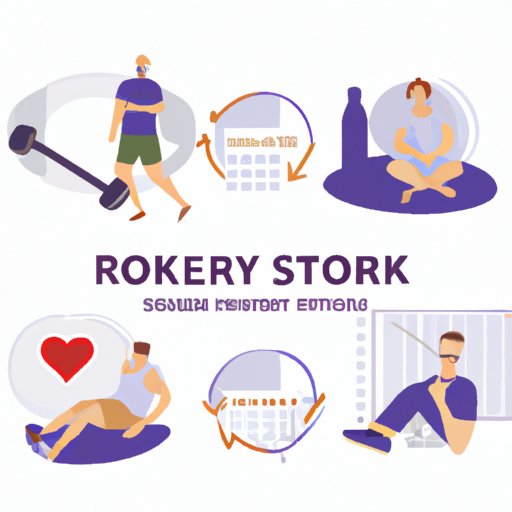
I. Introduction
Recovering from a stroke can be a long and difficult process for stroke survivors and their families. However, with the right rehabilitation techniques and self-care practices, it is possible to recover quickly and improve the chances of returning to a normal life. In this article, we will explore how to recover from stroke quickly through early rehabilitation, physical activity, balanced diet, support groups, and caregiving.
II. Emphasize the Importance of Early Rehabilitation
Early rehabilitation is the key to a successful stroke recovery. Rehabilitation programs aim to restore as much function as possible and help stroke survivors adapt to any limitations or disabilities. There are several types of rehabilitation available, including physical therapy, speech therapy, and occupational therapy. A qualified healthcare professional can help determine the appropriate rehabilitation program for a stroke survivor.
In addition to rehabilitation programs, there are several other factors that can help in stroke recovery, such as good sleep, proper hydration, and avoiding smoking and alcohol. Stroke survivors should speak to their healthcare provider to get a detailed recovery plan tailored to their specific needs.
III. Encourage Physical Activity
Physical activity is essential in a stroke recovery process as it helps improve blood flow, increase muscle strength, and prevent further health problems. Doctors recommend a combination of aerobic, strength, balance, and flexibility exercises to help in stroke recovery. However, it is important to start slow and build up gradually as per the recommendations of a qualified healthcare provider.
Here are a few examples of physical activities that can be incorporated into a stroke survivor’s daily routine:
- Walking or cycling: These can be enjoyed outdoors or on a stationary bike.
- Swimming or water aerobics: These low-impact exercises can be gentler on the joints and muscles.
- Yoga or tai chi: These exercises combine physical activity with relaxation techniques, which can help reduce stress and improve balance.
IV. Discuss the Importance of a Balanced Diet
Stroke survivors have special nutritional needs, and it is important to consume a balanced diet tailored to their medical needs. A healthy diet can help reduce the risk of further health complications and improve overall health.
Here are some foods and nutrients that can aid in stroke recovery:
- Fruits and vegetables: These are high in vitamins, fiber, and nutrients that can help improve cardiovascular health and reduce inflammation.
- Fish and lean protein: These are high in omega-3 fatty acids, which can help reduce the risk of heart disease and promote brain health.
- Whole grains: These are high in fiber and can help keep a healthy weight and reduce the risk of type 2 diabetes.
Stroke survivors should also limit their intake of saturated and trans fats, sodium, and cholesterol. A registered dietitian can help create a meal plan that meets the nutritional needs of a stroke survivor.
V. Support Groups and Mental Health
Mental health is an important component of stroke recovery, and depression and anxiety can be common among stroke survivors. Joining a support group or community involvement can offer emotional support, mental stimulation, and physical exercise. Support groups can also be helpful for caregivers and family members.
Here are some tips on how to join and participate in support groups:
- Consult a healthcare provider or a social worker for recommendations on support groups in the area.
- Check online resources such as the American Stroke Association to locate support groups near the area.
- Participate in social activities such as community classes or volunteer work.
VI. The Role of Caregivers
Caregivers play a crucial role in the stroke recovery process. Caretakers should support the stroke survivors in rehabilitation, exercise, and activities of daily living. Caregivers should also prioritize self-care as they are at risk of burnout, exhaustion, and depression.
Here are some tips on how caregivers can best support stroke survivors:
- Communicate with healthcare providers to learn about the stroke survivor’s medical needs and recovery plan.
- Encourage stress reduction techniques such as meditation or breathing exercises.
- Take breaks and prioritize their own self-care.
VII. Conclusion
In conclusion, recovering from stroke quickly is a challenging process, but with the right approach and assistance, it can be achieved. Early rehabilitation, physical activity, balanced diet, mental health support, and caregiver assistance is the key to a successful stroke recovery. Stroke survivors should work with their healthcare providers to create a detailed recovery plan tailored to their needs, and caregivers should prioritize self-care to avoid burnout. By following the tips outlined in this article, stroke survivors can increase their chances of achieving a full recovery.
For additional information and resources, stroke survivors and their families can visit the websites of organizations such as the American Stroke Association or National Stroke Association.




